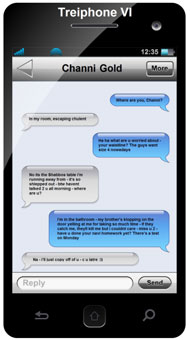
Re’eh: Toxic Texting
Do we look like the Ukrainian peasant's old potato sack that had a hole in it? Every time he picked a potato and put it in the sack, another one fell out…

"If your brother, the son of your mother, or your son or your daughter, or the wife of your bosom, or your friend who is like your own soul will entice you secretly, saying, 'Let us go and worship the gods of others' – that you did not know, you or your forefathers, from the gods of the peoples that are all around you, those near to you or those far from you…you shall not accede to him and not hearken to him." (Deuteronomy 13:7-9).
We know that the Torah is universal and its messages are timeless. Everything in the Torah has a message for posterity. With that in mind, for a long time, I had difficulty understanding the above passage. Sure, our generation has problems. Violence is all over the place. Moral decadence is unprecedented. That's nothing new. But who ever heard of their friend, parent, spouse or fellow sibling engaging in idolatry? Maybe I'm naïve, but I don't know anyone who worships statues of wood and stone, except for the few lost souls that are searching for something up in the mountains of India or Nepal. Until…
Two years ago, on one of my trips to the USA, I met a cherished and highly esteemed friend in Brooklyn, Rabbi Zecharia Wallerstein shlit'a, one of the Torah world's best educators, and in my opinion, one of the Torah world's best speakers. We spoke about a problem that both of us take to heart: all the young people  from observant families who fall off the path of Torah observance. We work so hard in reaching out to Jews who never learned a thing about their Judaism and to introduce them into the world of Torah and emuna, yet for every newcomer to observant Judaism, there's a young person who was born into the program and that's now fallen off the path. It's so acute today that it makes the Jewish World look like the poor Ukrainian peasant's old potato sack that had a hole in it – every time he picked a potato and put it in the sack, another potato fell out.
from observant families who fall off the path of Torah observance. We work so hard in reaching out to Jews who never learned a thing about their Judaism and to introduce them into the world of Torah and emuna, yet for every newcomer to observant Judaism, there's a young person who was born into the program and that's now fallen off the path. It's so acute today that it makes the Jewish World look like the poor Ukrainian peasant's old potato sack that had a hole in it – every time he picked a potato and put it in the sack, another potato fell out.
Rabbi Wallerstein told me an alarming statistic, something he painfully knows firsthand: more than 15% of religious high-school girls in the New York area text-message on Shabbat!
With a mixture of alarm and disbelief, I expressed my skepticism at what he said: "C'mon, Rabbi Zechariah – this has to be an exaggeration."
Without blinking, he replied, "I wish it were, but in actuality, the number is probably a lot higher. The girls lock themselves in their bedrooms or in the bathroom most of Shabbat; they don't care about the meal with the family, the singing of Shabbat songs or anything else. Their smartphones rule, overriding everything else."
The Chatam Sofer cites Rashi's elaboration of the Gemara in Tractate Chulin and says that willfully violating the Sabbath is tantamount to idolatry, because the willful violator is denying that Hashem created the world in six days and rested on the seventh.
A person who was born into an observant home and knows that the Torah requires us to observe the Shabbat, yet opts to violate the Shabbat, is called a willful violator of the Shabbat.
Could our above passage at hand be a prophecy of teens, or even adults, using their smartphones and text-messaging on Shabbat? Is that what the Torah is talking about when it mentions your brother, your son or your daughter, or your best friend enticing you to idolatry? It sure is. How? The violation of Shabbat begins by "innocently" leaving their phone on. They then see a message from their best friend. They tell themselves, "Oh, if my girlfriend from Bais Yaacov is texting me on Shabbat, then it's not so bad." Their conscience gives them a pinch the first time they break Shabbat. Yet, when they repeat, and they see that a bolt of lightning doesn't zap them in the head, it becomes easy. Soon, Shabbat is out the window, together with emuna, modesty and every other Jewish value.
Here in Ashdod, with Israel's third largest ultra-religious population, a terrible tragedy recently occurred in a young Chassidic family with three children. Against her husband's wishes, the young wife and mother received a gift from her "modern" Orthodox grandparents from overseas – a brand new iPhone. The iPhone soon corroded her relationship, as even non-Jewish media and medical sources are reporting. Soon, in addition to neglecting her husband, she was neglecting her children, a phenomenon that secular media admits to as well. But, when she began to violate the Shabbat and text-message, the husband gave her an ultimatum – either give up the smartphone and agree to professional counseling, or give up the family. She opted for the latter. Who would believe it? All of us in Ashdod now do; we witnessed this tragedy within our midst…
The Torah knows what it's talking about. So do our rabbis and spiritual guides when they cry out against the dangers of techno-poison.
My esteemed and beloved teacher Rabbi Shalom Arush recently gave all the students of our Kollel (married-men's yeshiva) a clear cut choice – your smartphone or our Kollel – you can't have both. He even came out strongly against the so-called "kosher" smartphones with limited access. Why? When it comes to protecting our souls, our emuna and our relationship with Hashem, one must take every precaution.












Tell us what you think!
Thank you for your comment!
It will be published after approval by the Editor.